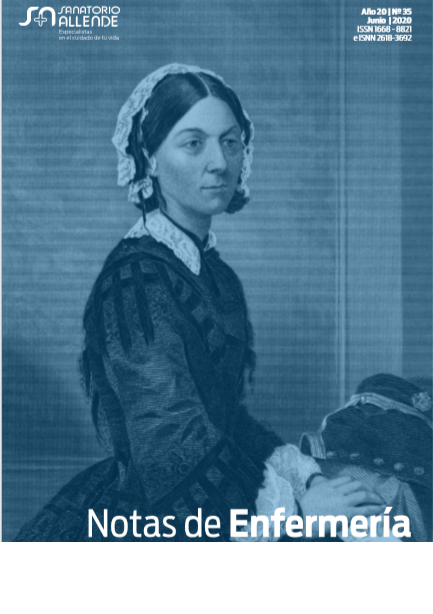Daily practices of the informal career of ambulatory oncological patients. Year 2019
DOI:
https://doi.org/10.59843/2618-3692.v20.n35.29158Keywords:
Neoplasms, Caregivers, Activities of Daily LivingAbstract
Oncological disease is characterized by a profound alteration in the regulation of cell growth and / or death, with the ability to spread remotely. During their treatment they require the help of caregivers who are often their own family, people from their environment who voluntarily assume the role of responsible in a broad sense and are willing to make decisions for and by the patient. Therefore, this study sought to describe the care practices carried out daily by the informal caregiver of assisted outpatient oncology patients in a public hospital in the city of Corrientes during 2019. With a descriptive, cross-sectional and observational design, the sample was made up of informal caregivers who met criteria of inclusion, exclusion and elimination previously defined. Data collection was carried out between August to October 2019 by applying a questionnaire to 90 informal caregivers. The average age was 43 years, 76% were women, in relation 44% were children and 24% were couples. On average they dedicated 14 hours a day to care, with 47% doing it in the three shifts. 42% were dependent workers, 26% housewives, 12% students, 7% retired; freelancers 9% and 4% unemployed. The activity they performed most frequently was accompaniment to clinical consultations with 81%. These caregivers, in addition to developing daily practices with their sick family member, also fulfilled work and study obligations. The existence of this disease affects the life not only of those who suffer it directly but also that of the family and immediately that of the informal caregiver. The repercussions can be minimized if they receive adequate support from the nursing staff, including not only the sick person but also the informal caregiver in their care.
Downloads
References
1.Instituto Nacional del Cancer. Manual de enfermería oncológica. In Goldman A, editor. Manual de enfermería oncológica. Buenos Aires: Ministerio de Salud Publica; 2014. p. 10. Citado 30 de noviembre de 2019. Disponible en http://www.msal.gob.ar/images/stories/bes/graficos/0000000510cnt-38-ManualEnfermeriaOncologica2014.pdf
2.Barrón Ramírez S, Alvarado Aguilar. Desgaste Físico y Emocional del Cuidador Primario en Cáncer. Instituto Nacional de Cancerología de México. 2009 Abril; 4(1). Citado 30 de noviembre de 2019. Disponible en http://incanmexico.org/revistainvestiga/elementos/documentosPortada/1257541295.pdf
3.Ruiz Río AE, Nava Galán MG. Cuidadores: responsabilidades-obligaciones. Enf Neurol. 2012 Marzo; 11(3). Citado 30 de noviembre de 2019. Disponible en https://www.medigraphic.com/pdfs/enfneu/ene-2012/ene123i.pdf
4.Burgos Garrido P FRVFVMQ. Caracterizacion y Nivel de Conocimiento del Cuidador Informal de Usuarios con Dependencia Severa Adscritos al Centro de Salud Violeta Parra – CHILLÁN. Theoria. 2008 Julio; 17(2). Citado el 30 de noviembre de 2019. Disponible en http://repositoriocdpd.net:8080/bitstream/handle/123456789/967/Art_BurgosGarridoP_CaracterizacionNivelConocimiento_2008.pdf?sequence=1
5.Ayala de Calvo LE, Sepulveda-Carrillo GJ. Necesidades de cuidado de pacientes con cáncer en tratamiento ambulatorio. Enfermeria Global. 2017 Enero; 16(1). Citado 30 de noviembre de 2019. Disponible en https://revistas.um.es/eglobal/article/view/231681
6.Caqueo-Urizar A, Segovia-Lagos P, Urrutia U. IMPACTO DE LA RELACIÓN DE AYUDA DE CUIDADORES PRIMARIOS EN LA CALIDAD DE VIDA DE PACIENTES CON CÁNCER AVANZADO. Psicooncologia. 2013 Noviembre; 10(1). Citado 30 de noviembre de 2019. Disponible en https://core.ac.uk/download/pdf/38820308.pdf
7.Guerrero-Nava JA, Romero-Quechol G, Martinez-Olivares M. Percepción del cuidador primario sobre las intervenciones de enfermería al paciente en estado terminal. Revista de Enfermería del Instituto Mexicano del Seguro Social. 2016 Agosto; 24(2). Citado 30 de noviembre de 2019. Disponible en https://www.medigraphic.com/pdfs/enfermeriaimss/eim2016/eim162d.pdf
8.Inmaculada Ubeda B. Calidad de vida de los cuidadores familiares: evaluación mediante un cuestionario. Universitat de Barcelona. 2009 Marzo; 1(1). Citado 30 de noviembre de 2019. Disponible en http://diposit.ub.edu/dspace/bitstream/2445/35130/1/IUB_TESIS.pdf
9.Garassini E. Narrativas de familiares de pacientes con cáncer. CES Psicologia. 2015 diciembre; 8(2). Citado el 7 de diciembre de 2019. Disponible en: https://www.redalyc.org/pdf/4235/423542417005.pdf
10.Montalvo Prieto BNCPMRMSPLRG. Habilidad de cuidado de cuidadores familiares principales de pacientes con ACV. Cartagena (Colombia). Salud Uninorte. 2010 Diciembre; 26(2). Citado 30 de noviembre de 2019. Disponible en http://rcientificas.uninorte.edu.co/index.php/salud/article/view/200/1175
11.Moreira de Souza R, Turrini R. Paciente Oncologico Terminal: Sobrecarga del Cuidador. Enfermeria Global. 2011 Abril; 22(22). Citado 30 de noviembre de 2019. Disponible en http://www.enfermeriaaps.com/portal/wpcontent/uploads/2015/07/Influencia-de-la-dependencia-de-los-enfermos-oncol%C3%B3gicos.pdf
12.Rodriguez A, Rihuete Galve. Influencia de la dependencia de los enfermos oncológicos en la sobrecarga de sus cuidadores familiares. Elsevier España, S.L. 2010 Enero; 18(4). Citado 30 de noviembre de 2019. Disponible enhttp://www.enfermeriaaps.com/portal/wpcontent/uploads/2015/07/Influencia-de-la-dependencia-de-los-enfermos-oncol%C3%B3gicos.pdf
13. Moreira de Souza R, Turrini R. Paciente Oncologico Terminal: Sobrecarga del Cuidador. Enfermeria Global. 2011 Abril; 22(22). Citado 30 de noviembre de 2019. Disponible enhttp://www.enfermeriaaps.com/portal/wpcontent/uploads/2015/07/Influencia-de-la-dependencia-de-los-enfermos-oncol%C3%B3gicos.pdf
14.Inmaculada Ubeda B. Calidad de vida de los cuidadores familiares: evaluación mediante un cuestionario. Universitat de Barcelona. 2009 Marzo; 1(1). Citado 30 de noviembre de 2019. Disponible enhttp://diposit.ub.edu/dspace/bitstream/2445/35130/1/IUB_TESIS.pdf
15.Garassini E. Narrativas de familiares de pacientes con cáncer. CES Psicologia. 2015 diciembre; 8(2). Citado el 7 de diciembre de 2019. Disponible en: https://www.redalyc.org/pdf/4235/423542417005.pdf
Downloads
Published
Issue
Section
License
Copyright (c) 2020 Sanatorio Allende

This work is licensed under a Creative Commons Attribution-NonCommercial 4.0 International License.
Those authors who have published with this journal, accept the following terms:
- Attribution — You must give appropriate credit, provide a link to the license, and indicate if changes were made. You may do so in any reasonable manner, but not in any way that suggests the licensor endorses you or your use.
- NonCommercial — You may not use the material for commercial purposes.

